牛津小学英语六年级上册
- 格式:docx
- 大小:17.20 KB
- 文档页数:7
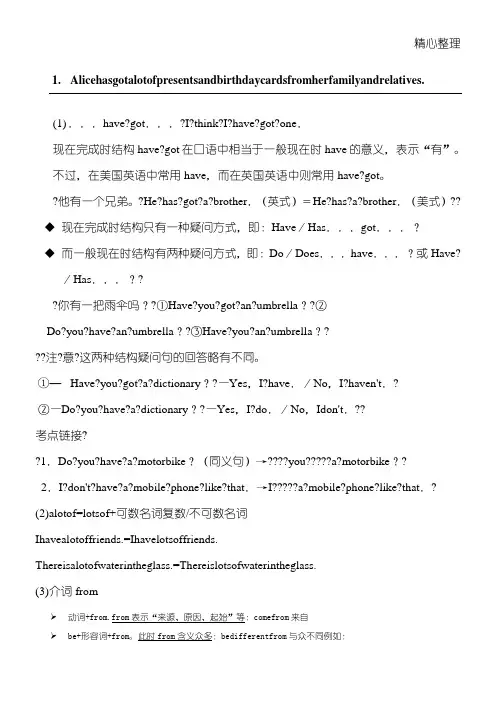
精心整理1.Alicehasgotalotofpresentsandbirthdaycardsfromherfamilyandrelatives.(1)...have?got...?I?think?I?have?got?one.现在完成时结构have?got在口语中相当于一般现在时have的意义,表示“有”。
不过,在美国英语中常用have,而在英国英语中则常用have?got。
?他有一个兄弟。
.(美式)??◆◆Have?/Has...???你有一把雨伞吗??①????注?意?①—??—Yes,I?have./No,I?haven't.?②—??—Yes,I?do./No,Idon't.??考点链接?1.Do?you?have?a?motorbike?(同义句)→????you?????a?motorbike??2.I?don't?have?a?mobile?phone?like?that.→I?????a?mobile?phone?like?that.?(2)alotof=lotsof+可数名词复数/不可数名词Ihavealotoffriends.=Ihavelotsoffriends.Thereisalotofwaterintheglass.=Thereislotsofwaterintheglass.(3)介词from2.Howmanyunclesdoyouhave?Howmany+可数名词复数+do/does+主语+have(howmany在句首,名词复数跟着走)Howmany的用法:1)therebe如果只能接Howmany+可数名词复数+arethere+Thereisabookonthedesk.Howmanybooksarethereonthedesk? Therearesevendaysinaweek.Howmanydaysarethereinaweek?Howmuch的用法:12)3)4)询问数字计算的结果,相当于what.Howmuchisthreeplusone?1.____________?meatdoyoueateveryweek?2.____________studentsarethereinyourclass?3.________?the?pants??They’re?15?yuan.?A.How?many?is????????????????B.How?many?are????C.How?much?is????????????????D.How?much?are3.Iusuallygoshoppingwithmyaunt.(1)always总是usually通常often经常sometimes有时候never从不表示频率,在句中可看做是插入语。
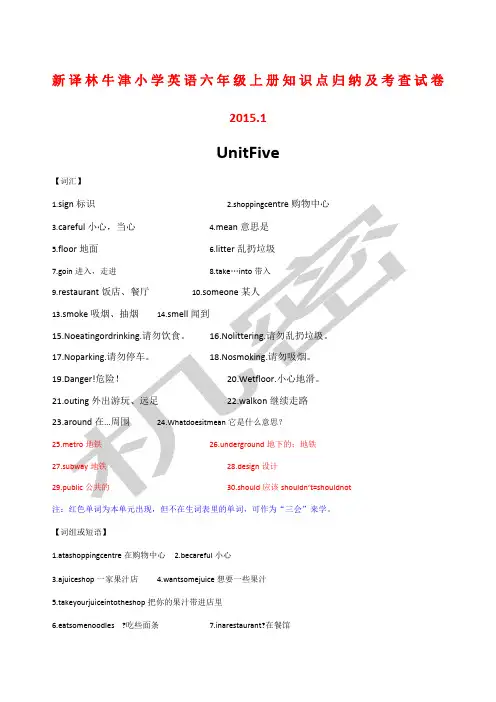
新译林牛津小学英语六年级上册知识点归纳及考查试卷2015.1UnitFive【词汇】1.3.5.9.13.注:红色单词为本单元出现,但不在生词表里的单词,可作为“三会”来学。
【词组或短语】1.atashoppingcentre在购物中心2.becareful小心3.ajuiceshop一家果汁店4.wantsomejuice想要一些果汁5.takeyourjuiceintotheshop把你的果汁带进店里6.eatsomenoodles ?吃些面条7.inarestaurant?在餐馆8.Issomeonesmoking有人在吸烟吗?9.Noeatingordrinking.禁止吃喝10.Nolittering.禁止扔垃圾11.Noparking.禁止停车12.Nosmoking.禁止吸烟13.Danger!危险14.Wetfloor.地板潮湿15.onanouting在郊游16.intheforest在森林里17.It’stimeforlunch.吃午饭的时间了。
18.feeltiredandhungry感觉又累又饿19.lookfor寻找1.①以②以2.本单元出现了许多标志图案,要求学生们能用英文就标志进行交流和表达。
句型为:WhatdoesitmeanItmeansyoucan/can’t…下面我们来认识一下。
隙。
bird,shirt,shirt,girl,dirty,first,thirty,thirteen,thirsty,sir…【知识点解析】1.Becareful,Tim!Tim小心。
Becareful!相当于Lookout!2.Doyouwantsomejuice你想要点饮料吗?表示建议或请求以及需要得到对方肯定回答的疑问句中用some而不用any。
如:Wouldyoulikesomethingtodrink?CanIaskyousomequestions?都是很简单的例句。
Whynotbuysomeapples为什么不买些苹果呢Wouldyoulikesomemorefruit你要不要再吃点水果3.in和into的区别。
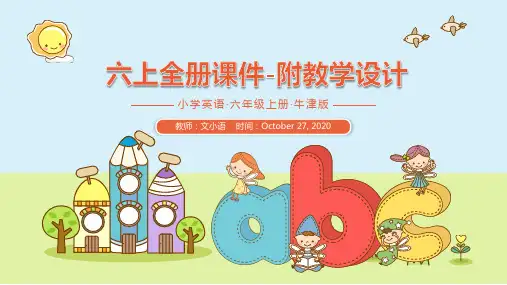
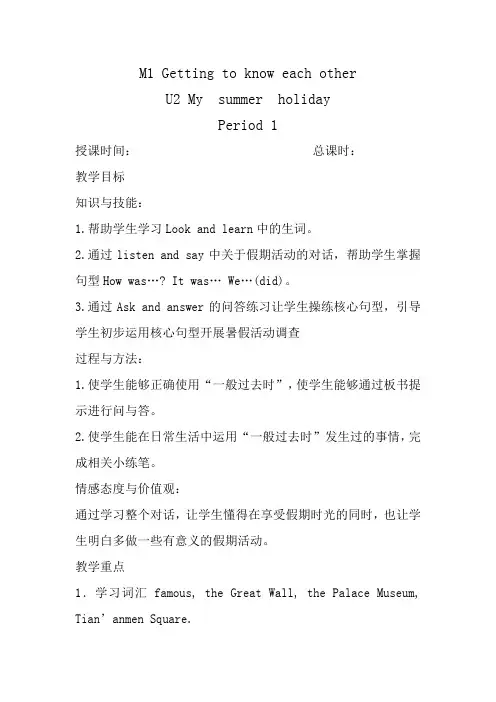
M1 Getting to know each otherU2 My summer holidayP eriod 1授课时间:总课时:教学目标知识与技能:1.帮助学生学习Look and learn中的生词。
2.通过listen and say中关于假期活动的对话,帮助学生掌握句型How was…? It was… We…(did)。
3.通过Ask and answer的问答练习让学生操练核心句型,引导学生初步运用核心句型开展暑假活动调查过程与方法:1.使学生能够正确使用“一般过去时”,使学生能够通过板书提示进行问与答。
2.使学生能在日常生活中运用“一般过去时”发生过的事情,完成相关小练笔。
情感态度与价值观:通过学习整个对话,让学生懂得在享受假期时光的同时,也让学生明白多做一些有意义的假期活动。
教学重点1.学习词汇famous, the Great Wall, the Palace Museum, Tian’anmen Square.2.分角色熟练朗读。
教学难点: 1.能正确运用“一般过去时”描述过去发生过的事情。
2.能正确使用句型How was your summer holiday. It was wonderful. We went to the Great Wall.用具准备 cassette , word cards .教学过程前置性作业Pre-task preparations1.询问学生每天的日常活动。
T: What do you do every day?然后把学生分成四人小组,请每位学生讲述自己每天常做的事情。
2.在黑板上写出学过的动词,如go, visit, do, watch, have, stay, play,单词写成竖列,请学生造句。
T: (write go on the blackboard)While-task procedures1.顺着上面最后一个学生的话语引出句型:I went swimming during the summer holiday.T: I went to the Great Wall during the summer holiday. What about you?T: Oh, (S2’s name) and I went to the Great Wall duringthe summer holiday. (write went next to goon the blackboard)用同样的方法引出动词visit、do、watch、have、stay、play的过去式。
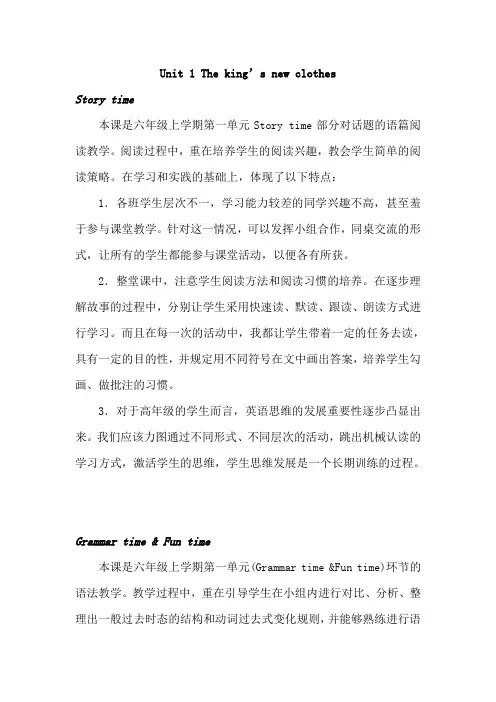
Unit 1 The king’s new clothesStory time本课是六年级上学期第一单元Story time部分对话题的语篇阅读教学。
阅读过程中,重在培养学生的阅读兴趣,教会学生简单的阅读策略。
在学习和实践的基础上,体现了以下特点:1.各班学生层次不一,学习能力较差的同学兴趣不高,甚至羞于参与课堂教学。
针对这一情况,可以发挥小组合作,同桌交流的形式,让所有的学生都能参与课堂活动,以便各有所获。
2.整堂课中,注意学生阅读方法和阅读习惯的培养。
在逐步理解故事的过程中,分别让学生采用快速读、默读、跟读、朗读方式进行学习。
而且在每一次的活动中,我都让学生带着一定的任务去读,具有一定的目的性,并规定用不同符号在文中画出答案,培养学生勾画、做批注的习惯。
3.对于高年级的学生而言,英语思维的发展重要性逐步凸显出来。
我们应该力图通过不同形式、不同层次的活动,跳出机械认读的学习方式,激活学生的思维,学生思维发展是一个长期训练的过程。
Grammar time & Fun time本课是六年级上学期第一单元(Grammar time &Fun time)环节的语法教学。
教学过程中,重在引导学生在小组内进行对比、分析、整理出一般过去时态的结构和动词过去式变化规则,并能够熟练进行语言练习。
纵观整节课的教学活动,总结出以下问题及经验:1.在小组活动中解决问题虽然降低了教学难度,但仍不能完全有效调动小组成员完成任务,个别组员存在“浑水摸鱼”的行为,因此小组活动前的任务分工很重要。
2.教学情景化是指课堂教学必须最大限度地引起学生的学习兴趣,为学生提供足够的机会用英语进行交流和活动,让学生感受到运用所学英语在课堂上进行交流后产生一种自豪感,心里产生愉悦感。
本节课中部分学生表演得相当出色,特别是得到老师的表扬时,这些学生的心情非常激动。
所以英语教学的课堂必须通过各种手段来提高学生的英语兴趣,要让小学生能够在四十分钟的时间内保持良好的学习状态,必须根据不同的教学内容创设各种情景,做到教学情景化。
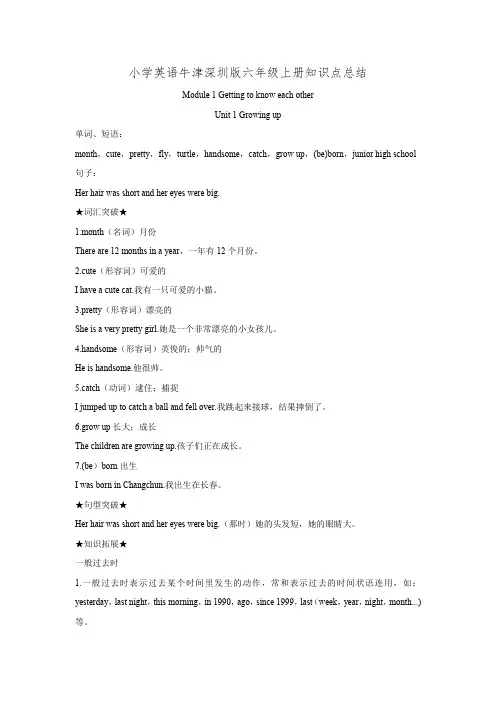
小学英语牛津深圳版六年级上册知识点总结Module 1 Getting to know each otherUnit 1 Growing up单词、短语:month,cute,pretty,fly,turtle,handsome,catch,grow up,(be)born,junior high school 句子:Her hair was short and her eyes were big.★词汇突破★1.month(名词)月份There are 12 months in a year,一年有12个月份。
2.cute(形容词)可爱的I have a cute cat.我有一只可爱的小猫。
3.pretty(形容词)漂亮的She is a very pretty girl.她是一个非常漂亮的小女孩儿。
4.handsome(形容词)英俊的;帅气的He is handsome.他很帅。
5.catch(动词)逮住;捕捉I jumped up to catch a ball and fell over.我跳起来接球,结果摔倒了。
6.grow up长大;成长The children are growing up.孩子们正在成长。
7.(be)born出生I was born in Changchun.我出生在长春。
★句型突破★Her hair was short and her eyes were big.(那时)她的头发短,她的眼睛大。
★知识拓展★一般过去时1.一般过去时表示过去某个时间里发生的动作,常和表示过去的时间状语连用,如:yesterday,last night,this morning,in 1990,ago,since 1999,last(week,year,night,month...)等。
2.下面的歌谣可以帮助你理解一般过去时,快来读一读吧!动词一般过去时,表示过去发生的事;一般动词加ed,若是特殊得硬记;be 用was 或用were,have,has变had;谓语动词过去式,过去时间做标志;否定句很简单,主语之后didn't添;疑问句也不难,did放在主语前。
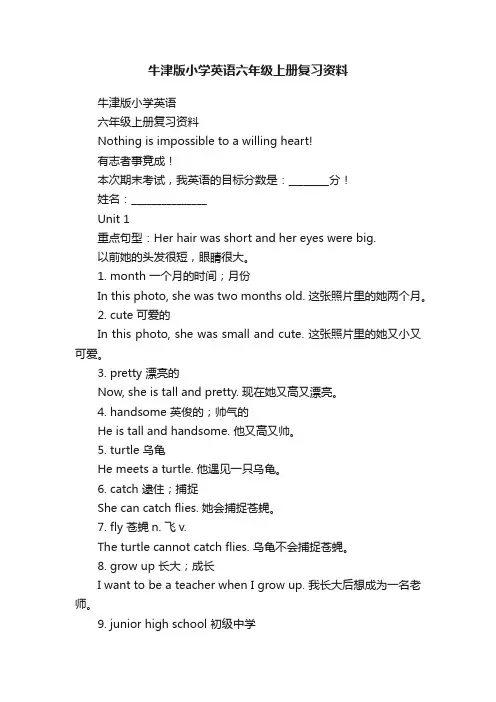
牛津版小学英语六年级上册复习资料牛津版小学英语六年级上册复习资料Nothing is impossible to a willing heart!有志者事竟成!本次期末考试,我英语的目标分数是:________分!姓名:_______________Unit 1重点句型:Her hair was short and her eyes were big.以前她的头发很短,眼睛很大。
1. month 一个月的时间;月份In this photo, she was two months old. 这张照片里的她两个月。
2. cute 可爱的In this photo, she was small and cute. 这张照片里的她又小又可爱。
3. pretty 漂亮的Now, she is tall and pretty. 现在她又高又漂亮。
4. handsome 英俊的;帅气的He is tall and handsome. 他又高又帅。
5. turtle 乌龟He meets a turtle. 他遇见一只乌龟。
6. catch 逮住;捕捉She can catch flies. 她会捕捉苍蝇。
7. fly 苍蝇n. 飞v.The turtle cannot catch flies. 乌龟不会捕捉苍蝇。
8. grow up 长大;成长I want to be a teacher when I grow up. 我长大后想成为一名老师。
9. junior high school 初级中学She goes to junior high school. 她读初中。
10. (be)born 出生Justin was born in the river. Justin 在河流出生。
Unit 2重点句型:How was your summer holiday?你的暑假过得怎样?It was wonderful!We went to the Great Wall.非常棒!我们去了长城。
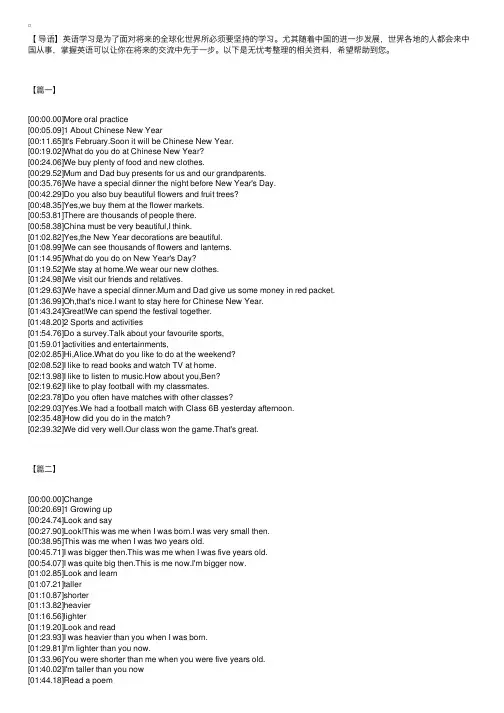
【导语】英语学习是为了⾯对将来的全球化世界所必须要坚持的学习。
尤其随着中国的进⼀步发展,世界各地的⼈都会来中国从事,掌握英语可以让你在将来的交流中先于⼀步。
以下是⽆忧考整理的相关资料,希望帮助到您。
【篇⼀】[00:00.00]More oral practice[00:05.09]1 About Chinese New Year[00:11.65]It's February.Soon it will be Chinese New Year.[00:19.02]What do you do at Chinese New Year?[00:24.06]We buy plenty of food and new clothes.[00:29.52]Mum and Dad buy presents for us and our grandparents.[00:35.76]We have a special dinner the night before New Year's Day.[00:42.29]Do you also buy beautiful flowers and fruit trees?[00:48.35]Yes,we buy them at the flower markets.[00:53.81]There are thousands of people there.[00:58.38]China must be very beautiful,I think.[01:02.82]Yes,the New Year decorations are beautiful.[01:08.99]We can see thousands of flowers and lanterns.[01:14.95]What do you do on New Year's Day?[01:19.52]We stay at home.We wear our new clothes.[01:24.98]We visit our friends and relatives.[01:29.63]We have a special dinner.Mum and Dad give us some money in red packet.[01:36.99]Oh,that's nice.I want to stay here for Chinese New Year.[01:43.24]Great!We can spend the festival together.[01:48.20]2 Sports and activities[01:54.76]Do a survey.Talk about your favourite sports,[01:59.01]activities and entertainments,[02:02.85]Hi,Alice.What do you like to do at the weekend?[02:08.52]I like to read books and watch TV at home.[02:13.98]I like to listen to music.How about you,Ben?[02:19.62]I like to play football with my classmates.[02:23.78]Do you often have matches with other classes?[02:29.03]Yes.We had a football match with Class 6B yesterday afternoon.[02:35.48]How did you do in the match?[02:39.32]We did very well.Our class won the game.That's great.【篇⼆】[00:00.00]Change[00:20.69]1 Growing up[00:24.74]Look and say[00:27.90]Look!This was me when I was born.I was very small then.[00:38.95]This was me when I was two years old.[00:45.71]I was bigger then.This was me when I was five years old.[00:54.07]I was quite big then.This is me now.I'm bigger now.[01:02.85]Look and learn[01:07.21]taller[01:10.87]shorter[01:13.82]heavier[01:16.56]lighter[01:19.20]Look and read[01:23.93]I was heavier than you when I was born.[01:29.81]I'm lighter than you now.[01:33.96]You were shorter than me when you were five years old.[01:40.02]I'm taller than you now[01:44.18]Read a poem[01:48.72]Tom Thumb was small,A few centimetres tall.[01:56.48]What do you think of that?[02:01.05]He only had a pin for a sword And a feather in his hat.[02:09.10]Tom Thumb was small,But he wasn't too small To fight against a rat. [02:20.25]He only had a pin for a sword And a feather in his hat.[02:29.19]Tom Thumb was brave,But he wasn't too brave.[02:37.26]He ran away from a cat.[02:41.38]He only had a pin for a sword And a feather in his hat.[02:49.33]Tommy Target[02:53.69]This was me when I was born.[02:59.04]when I was two years old.[03:03.59]when I was five years old.[03:08.16]I was heavier[03:12.60]lighter[03:15.66]taller[03:18.30]shorter[03:21.22]longer[03:24.38]shorter[03:27.31]than you when I was___years old.[03:33.08]than you when I was born[03:38.54]kilogramme(s)=kg[03:45.10]centimetre(s)=cm【篇三】[00:00.00]2 The weather[00:20.09]Say a rhyme[00:22.83]1 It's sunny today.[00:31.97]It's sunny today.I'll wear my hat.I'll wear my hat,When I go out to play. [00:43.21]2 It's rainy today.It's rainy today.I'll take my umbrella.[00:59.14]I'll take my umbrella,When I go out to play.[01:05.91]3 It's cold today.It's cold today.I'll wear my coat.[01:19.28]I'll wear my coat,When I go out to play.[01:25.45]4 It's windy today.It's windy today.[01:38.40]I'll take my kite,I'll take my kite,When I go out to play.[01:46.37]Draw and say[01:51.33]I like summer.It's my favourite season.Why?[02:01.29]Because we can go to the beach and we can swim.[02:06.93]I like autumn better than summer.[02:11.08]What's your favourite season,Eddie?[02:15.63]Summer![02:18.58]Spring[02:22.13]see new plants/flowers[02:26.29]see butterflies/bees/insects[02:32.14]play in the park[02:35.59]Autumn[02:38.96]go to a country park[02:42.51]fly a kite[02:45.43]have a barbecue[02:48.59]Summer[02:51.15]go to the beach[02:54.21]swim[02:56.77]make sandcastles[03:00.14]lie under an umbrella[03:03.67]Winter[03:06.51]wear warm coats/boots/scarves/gloves[03:13.07]make snowmen[03:16.02]ride skateboards[03:19.26]Look and read[03:24.12]1 This typhoon is dangerous,but that typhoon will be more dangerous. [03:36.58]2 The weather is wonderful today,[03:44.03]but the weather will be more wonderful tomorrow.[03:50.56]Read and act a rhyme[03:56.33]The wind and the sun[03:59.39]1 'I,'say the wind,'Am stronger than you.'[04:11.35]'you're not,'says the sun,'I am stronger than you.[04:20.31]2 'All right,'says the wind,'See how hard I blow.'[04:31.67]'Oh yes,'says the sun,'I can make the plants grow.'[04:40.50]3 'That man,'says the wind,I'll blow off his clothes.[04:51.11]'Let's see,'says the sun.And behind a cloud he goes.[04:59.89]4 'I'm cold,'says the man,'I'll put on my scarf.'[05:11.12]'I told you,'says the sun.And then begins to laugh.[05:19.06]5 'your turn,' says the wind,'I've had mine.'[05:29.51]'OK,'says the sun.Then begins to shine.[05:36.07]6 'I'm hot,'say the man,'I'll have a swim.'[05:46.33]And takes off his clothes.'See,'says the sun,'I win!'[05:54.87]Tommy Target[05:57.64]I like spring[06:01.72]summer[06:04.36]autumn[06:07.10]winter[06:10.44]better than___.[06:14.00]Why?[06:16.56]Because we can go to the beach.[06:21.13]have a barbecue.[06:24.78]ride our bicy cles.[06:28.55]___is dangerous,but__is more dangerous.[06:35.99]___is beautiful,but__is more beautiful.[06:44.24]___is interesting,but__is more interesting.[06:52.60]___is exciting,but__is more exciting.[07:00.26]___is frightening,but__is more frightening.[07:08.51]___is wonderful,but__is more wonderful.。
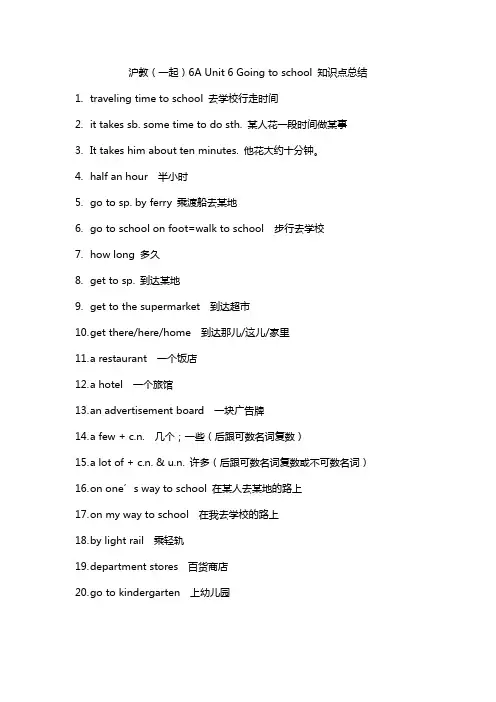
沪教(一起)6A Unit 6 Going to school 知识点总结1.traveling time to school 去学校行走时间2.it takes sb. some time to do sth. 某人花一段时间做某事3.It takes him about ten minutes. 他花大约十分钟。
4.half an hour 半小时5.go to sp. by ferry 乘渡船去某地6.go to school on foot=walk to school 步行去学校7.how long 多久8.get to sp. 到达某地9.get to the supermarket 到达超市10.g et there/here/home 到达那儿/这儿/家里11.a restaurant 一个饭店12.a hotel 一个旅馆13.a n advertisement board 一块广告牌14.a few + c.n. 几个;一些(后跟可数名词复数)15.a lot of + c.n. & u.n. 许多(后跟可数名词复数或不可数名词)16.o n one’s way to school 在某人去某地的路上17.o n my way to school 在我去学校的路上18.b y light rail 乘轻轨19.d epartment stores 百货商店20.g o to kindergarten 上幼儿园语言点1. near 离…很近后面直接接地点I live near school.=My home is near school.我家离学校很近。
2. far away from=far from离…很远He lives far away from school.=His home is far from school.他家离学校很远3.by bus/bike/car/underground/train/ferry动词短语:take a bus/bike/car/underground/train/ferry ride a bikeHe goes to school by bus.=He takes a bus to school.4. on foot 动词:walkShe goes to work on foot every day.=She walks to work every day.5. It takes sb. some time to do sth. 花费某人多少时间做某事。
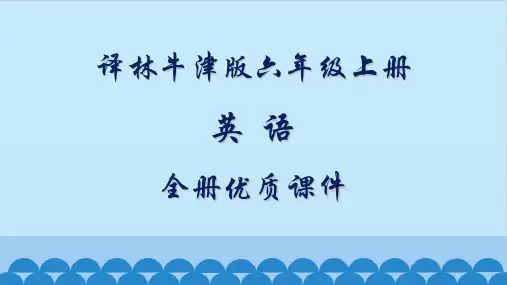
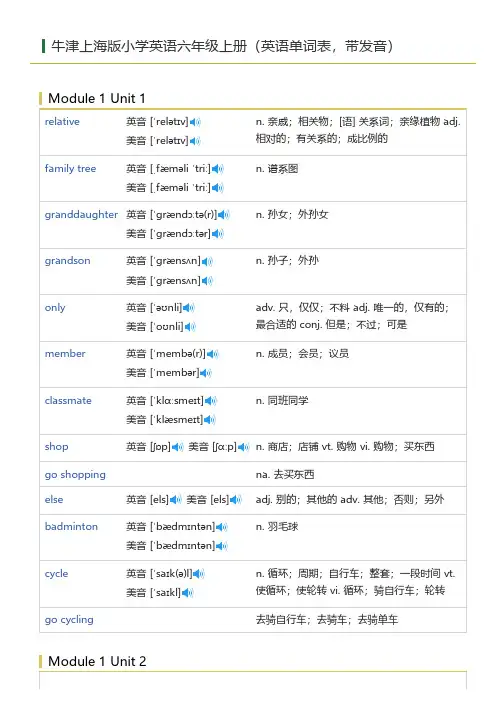
牛津上海版小学英语六年级上册(英语单词表,带发音)Module 1 Unit 1Module 1 Unit 2relative英音 [ˈrel ət ɪv]美音 [ˈrel ət ɪv]n. 亲戚;相关物;[语] 关系词;亲缘植物 adj.相对的;有关系的;成比例的family tree英音 [ˌfæm əli ˈtri ː]美音 [ˌfæm əli ˈtri ː]n. 谱系图granddaughter 英音 [ˈɡrænd ɔːt ə(r)]美音 [ˈɡrænd ɔːt ər]n. 孙女;外孙女grandson英音 [ˈɡræns ʌn]美音 [ˈɡræns ʌn]n. 孙子;外孙only英音 [ˈəʊnli]美音 [ˈo ʊnli]adv. 只,仅仅;不料 adj. 唯一的,仅有的;最合适的 conj. 但是;不过;可是member英音 [ˈmemb ə(r)]美音 [ˈmemb ər]n. 成员;会员;议员classmate英音 [ˈklɑːsme ɪt]美音 [ˈklæsme ɪt]n. 同班同学shop 英音 [ʃɒp]美音 [ʃɑːp]n. 商店;店铺 vt. 购物 vi. 购物;买东西go shopping na. 去买东西else 英音 [els]美音 [els]adj. 别的;其他的 adv. 其他;否则;另外badminton英音 [ˈbædm ɪnt ən]美音 [ˈbædm ɪnt ən]n. 羽毛球cycle 英音 [ˈsa ɪk(ə)l]美音 [ˈsa ɪkl]n. 循环;周期;自行车;整套;一段时间 vt.使循环;使轮转 vi. 循环;骑自行车;轮转go cycling去骑自行车;去骑车;去骑单车almost英音 [ˈɔːlməʊst]美音 [ˈɔːlmoʊst]adv. 差不多,几乎never英音 [ˈnevə(r)]美音 [ˈnevər]adv. 从未;决不other英音 [ˈʌðə(r)]美音 [ˈʌðər]adj. 其他的,另外的 pron. 另外一个each other pron. 彼此friendly英音 [ˈfrendli]美音 [ˈfrendli]adj. 友好的;亲切的;支持的;融洽的,和睦的 adv. 友善地;温和地helpful英音 [ˈhelpfl]美音 [ˈhelpfl]adj. 有帮助的;有益的naughty英音 [ˈnɔːti]美音 [ˈnɔːti]adj. 顽皮的,淘气的;不听话的;没规矩的;不适当的;下流的lie英音 [laɪ]美音 [laɪ]vi. 躺;说谎;位于;展现 vt. 谎骗 n. 谎言;位置ocean英音 [ˈəʊʃ(ə)n]美音 [ˈoʊʃn]n. 海洋;大量;广阔yet 英音 [jet]美音 [jet]conj. 但是;然而 adv. 还;但是;已经just英音 [dʒʌst]美音 [dʒʌst]adv. 只是,仅仅;刚才,刚刚;正好,恰好;实在;刚要 adj. 公正的,合理的;正直的,…already英音 [ɔːlˈredi]美音 [ɔːlˈredi]adv. 已经,早已;先前Earth英音 [ɜːθ]美音 [ɜːrθ]n. 地球;地表,陆地;土地,土壤;尘事,俗事;兽穴 vt. 把(电线)[电] 接地;盖…look after英音 [lʊk ˈɑːftə(r)]美音 [lʊk ˈæftər]na. 照看;照顾;看管;对…负责environment英音 [ɪnˈvaɪrənmənt]美音 [ɪnˈvaɪrənmənt]n. 环境,外界Module 3 Unit 8pollute 英音 [p əˈlu ːt]美音 [p əˈlu ːt]vt. 污染;玷污;败坏pollution 英音 [p əˈlu ːʃ(ə)n]美音 [p əˈlu ːʃn]n. 污染 污染物land 英音 [lænd]美音 [lænd]n. 国土;陆地;地面 vt. 使…登陆;使…陷于;将…卸下 vi. 登陆;到达keep 英音 [ki ːp]美音 [ki ːp]vt. 保持;经营;遵守;饲养 vi. 保持;继续不断 n. 保持;生计;生活费pick up v. 拾起;探出;重新开始into英音 [ˈɪnt ə]美音 [ˈɪnt ə; ˈɪntu; ˈɪntu ː]prep. 到…里;深入…之中;成为…状况;进入到…之内rubbish bin 垃圾桶;垃圾箱;垃圾筒leave英音 [li ːv]美音 [li ːv]vt. 离开;留下;遗忘;委托 vi. 离开,出发;留下 n. 许可,同意;休假promise 英音 [ˈpr ɒm ɪs]美音 [ˈprɑːm ɪs]n. 许诺,允诺;希望 vt. 允诺,许诺;给人以…的指望或希望 vi. 许诺;有指望,有前途discuss 英音 [d ɪˈsk ʌs]美音 [d ɪˈsk ʌs]vt. 讨论;论述,辩论reuse 英音 [ˌri ːˈju ːz]美音 [ˌri ːˈju ːz]n. 重新使用,再用 vt. 再使用kind英音 [ka ɪnd]美音 [ka ɪnd]n. 种类;性质 adj. 和蔼的;宽容的;令人感激的menu英音 [ˈmenju ː]美音 [ˈmenju ː]n. 菜单 饭菜cabbage英音 [ˈkæb ɪd ʒ]美音 [ˈkæb ɪd ʒ]n. 卷心菜,甘蓝菜,洋白菜;(俚)脑袋;(非正式、侮辱)植物人(常用于英式英…garlic英音 [ˈɡɑːl ɪk]n. 大蒜;蒜头美音 [ˈɡɑːrlɪk]noodle英音 [ˈnuːd(ə)l]美音 [ˈnuːd(ə)l]n. 面条;笨蛋seafood英音 [ˈsiːfuːd]美音 [ˈsiːfuːd]n. 海鲜;海味;海产食品steam英音 [stiːm]美音 [stiːm]n. 蒸汽;精力 adj. 蒸汽的 vt. 蒸,散发;用蒸汽处理 vi. 蒸,冒水汽prawn英音 [prɔːn]美音 [prɔːn]n. 对虾,明虾 vi. 捕虾also英音 [ˈɔːlsəʊ]美音 [ˈɔːlsoʊ]conj. 并且;另外 adv. 也;而且;同样kind英音 [kaɪnd]美音 [kaɪnd]n. 种类;性质 adj. 和蔼的;宽容的;令人感激的fry英音 [fraɪ]美音 [fraɪ]n. 鱼苗;油炸食物 vt. 油炸;油煎 vi. 油炸;油煎bacon英音 [ˈbeɪkən]美音 [ˈbeɪkən]n. 咸肉;腌肉;熏猪肉boil英音 [bɔɪl]美音 [bɔɪl]n. 沸腾,煮沸;疖子 vt. 煮沸,烧开;使…激动;使…蒸发 vi. 煮沸,沸腾;激动,激昂wing英音 [wɪŋ]美音 [wɪŋ]n. 翼;翅膀;飞翔;派别;侧厅,耳房,厢房vt. 使飞;飞过;空运;增加…速度;装以翼…stall英音 [stɔːl]美音 [stɔːl]n. 货摊;畜栏;托辞 vt. 拖延;使停转;使陷于泥中 vi. 停止,停转;拖延section英音 [ˈsekʃn]美音 [ˈsekʃn]n. 截面;部分;部门;地区;章节 vt. 把…分段;将…切片;对…进行划分 vi. 被切割成片…frozen英音 [ˈfrəʊz(ə)n]美音 [ˈfroʊzn]v. 结冰(freeze的过去分词);凝固;变得刻板 adj. 冻结的;冷酷的packet英音 [ˈpækɪt]美音 [ˈpækɪt]n. 数据包,信息包;小包,小捆 vt. 包装,打包Module 1 Unit 3bake 英音 [be ɪk]美音 [be ɪk]n. 烤;烘烤食品 vi. 烘面包;被烤干;受热 vt.烤,烘焙hamburger 英音 [ˈhæmb ɜːɡə(r)]美音 [ˈhæmb ɜːrɡər]n. 汉堡包,火腿汉堡;牛肉饼,肉饼;碎牛肉spend英音 [spend]美音 [spend]n. 预算 vt. 度过,消磨(时光);花费;浪费;用尽 vi. 花钱;用尽,耗尽island英音 [ˈa ɪl ənd]美音 [ˈa ɪl ənd]n. 岛;岛屿;安全岛;岛状物 adj. 岛的 vt. 孤立;使成岛状bay英音 [be ɪ]美音 [be ɪ]n. 海湾;狗吠声 vt. 向…吠叫 vi. 吠叫;大声叫嚷dragon英音 [ˈdræɡən]美音 [ˈdræɡən]n. 龙;凶暴的人,凶恶的人;严厉而有警觉性的女人weekend英音 [ˌwi ːk ˈend]美音 [ˈwi ːkend]n. 周末,周末休假;周末聚会 adj. 周末的,周末用的 vi. 度周末seaside英音 [ˈsi ːsa ɪd]美音 [ˈsi ːsa ɪd]n. 海边;海滨 adj. 海边的;海滨的lucky英音 [ˈl ʌki]美音 [ˈl ʌki]adj. 幸运的;侥幸的market英音 [ˈmɑːk ɪt]美音 [ˈmɑːrk ɪt]n. 市场;行情;股票市场;市面;集市;销路;商店 vt. 在市场上出售 vi. 做买卖space英音 [spe ɪs]美音 [spe ɪs]n. 空间;太空;距离 vt. 隔开 vi. 留间隔museum英音 [mju ˈzi ːəm]美音 [mju ˈzi ːəm]n. 博物馆activity英音 [æk ˈt ɪv əti]美音 [æk ˈt ɪv əti]n. 活动;行动;活跃barbecue英音 [ˈbɑːb ɪkju ː]n. 烤肉;吃烤肉的野宴 vt. 烧烤;烤肉Module 2 Unit 4美音 [ˈbɑːrb ɪkju ː]kite英音 [ka ɪt]美音 [ka ɪt]n. 风筝 vi. 使用空头支票;像风筝一样飞;轻快地移动 vt. 骗钱;涂改(支票)sandcastle英音 [ˈsændkɑːsl]美音 [ˈsændkæsl]n. 沙塔collect英音 [k əˈlekt]美音 [k əˈlekt]vt. 收集;募捐 adj. 由收件人付款的 vi. 收集;聚集;募捐 adv. 由收件人付款地album英音 [ˈælb əm]美音 [ˈælb əm]n. 相簿;唱片集;集邮簿;签名纪念册plan英音 [plæn]美音 [plæn]n. 计划;平面图 vt. 计划;设计;打算 vi. 计划;打算shall英音 [ʃəl; ʃæl]美音 [ʃəl; ʃæl]aux. 应;会;将;必须o'clock abbr. …点钟(等于of the clock)cost英音 [k ɒst]美音 [k ɔːst]n. 费用,代价,成本;损失 vt. 花费;使付出;使花许多钱 vi. 花费trip英音 [tr ɪp]美音 [tr ɪp]n. 旅行;绊倒;差错 vt. 绊倒;使犯错 vi. 绊倒;远足;犯错误;轻快地走secretary英音 [ˈsekr ət(ə)ri]美音 [ˈsekr əteri]n. 秘书;书记;部长;大臣bank英音 [bæŋk]美音 [bæŋk]n. 银行;岸;浅滩;储库 vt. 将…存入银行;倾斜转弯 vi. 堆积;倾斜转弯clerk英音 [klɑːk]美音 [kl ɜːrk]n. 职员,办事员;店员;书记;记账员;<古>牧师,教士 vi. 当销售员,当店员;当职员policewoman英音 [p əˈli ːsw ʊm ən]美音 [p əˈli ːsw ʊm ən]n. 女警察;女警官dentist英音 [ˈdent ɪst]n. 牙科医生 牙医诊所Module 2 Unit 5pilot英音 [ˈpa ɪl ət]美音 [ˈpa ɪl ət]n. 飞行员;领航员 adj. 试点的 v. 驾驶;领航;试用fireman英音 [ˈfa ɪəm ən]美音 [ˈfa ɪərm ən]n. 消防队员;救火队员;锅炉工postman英音 [ˈp əʊstm ən]美音 [ˈpo ʊstm ən]n. 邮递员;邮差shop assistant n. 店员;售货员person英音 [ˈp ɜːs(ə)n]美音 [ˈp ɜːrsn]n. 人;身体;容貌,外表;人称teach 英音 [ti ːt ʃ]美音 [ti ːt ʃ]vt. 教;教授;教导 vi. 教授;讲授;当老师put out v. 扑灭;熄灭;放出;伸出interview英音 [ˈɪnt əvju ː]美音 [ˈɪnt ərvju ː]n. 接见,采访;面试,面谈 vt. 采访;接见;对…进行面谈;对某人进行面试find out na. 查出;发现;看清…的面目;识破if英音 [ɪf]美音 [ɪf]conj. (表条件)如果;即使;是否;(表假设)假如 n. 条件;设想finish英音 [ˈf ɪn ɪʃ]美音 [ˈf ɪn ɪʃ]n. 结束;完美;回味(葡萄酒) vt. 完成;结束;用完 vi. 结束,终止;终结age英音 [e ɪd ʒ]美音 [e ɪd ʒ]n. 年龄;时代;寿命,使用年限;阶段 vt. 使成熟;使变老,使上年纪 vi. 成熟;变老programme英音 [ˈpr əʊɡræm]美音 [ˈpro ʊɡræm]n. 计划,规划;节目;程序 vt. 规划;拟…计划 vi. 编程序;制作节目entrance英音 [ˈentr əns]美音 [ˈentr əns; ɪn ˈtræns]n. 入口;进入 vt. 使出神,使入迷choir英音 [ˈkwa ɪə(r)]n. 唱诗班;合唱队;舞蹈队 vt. 合唱 vi. 合唱noticeboard英音 [ˈnəʊtɪsbɔːd]美音 [ˈnoʊtɪsbɔːrd]n. 布告栏;警告牌parent英音 [ˈpeərənt]美音 [ˈperənt]n. 父亲(或母亲);父母亲;根源arrive英音 [əˈraɪv]美音 [əˈraɪv]vi. 到达;成功;达成;出生first英音 [fɜːst]美音 [fɜːrst]num. 第一 n. 第一;开始;冠军 adj. 第一的;基本的;最早的 adv. 第一;首先;优…classroom英音 [ˈklɑːsruːm]美音 [ˈklæsruːm; ˈklæsrʊm]n. 教室next 英音 [nekst]美音 [nekst]adv. 然后;下次;其次 adj. 下一个的;其次的;贴近的 n. 下一个 prep. 靠近;居于…之后project英音 [ˈprɒdʒekt]美音 [ˈprɑːdʒekt]n. 工程;计划;事业 vt. 设计;计划;发射;放映 vi. 设计;计划;表达;投射craft英音 [krɑːft]美音 [kræft]n. 工艺;手艺;太空船 vt. 精巧地制作club英音 [klʌb]美音 [klʌb]n. 俱乐部,社团;夜总会;棍棒;(扑克牌中的)梅花 adj. 俱乐部的 vt. 用棍棒打;募集 …finally英音 [ˈfaɪnəli]美音 [ˈfaɪnəli]adv. 最后;终于;决定性地ground英音 [ɡraʊnd]美音 [ɡraʊnd]n. 地面;土地;范围;战场;根据 v. 研磨(grind的过去分词);压迫 adj. 土地的;…invitation英音 [ˌɪnvɪˈteɪʃn]美音 [ˌɪnvɪˈteɪʃn]n. 邀请;引诱;请帖;邀请函yesterday英音 [ˈjestədeɪ]美音 [ˈjestərdeɪ; ˈjestərdi]n. 昨天;往昔 adv. 昨天Module 2 Unit 6travel英音 [ˈtræv(ə)l]美音 [ˈtrævl]n. 旅行;游历;漫游 vt. 经过;在…旅行 vi. 旅行;行进;步行;交往about英音 [əˈbaʊt]美音 [əˈbaʊt]prep. 关于;大约 n. 大致;粗枝大叶;不拘小节的人 adj. 在附近的;四处走动的;在起作…minute英音 [ˈmɪnɪt]美音 [ˈmɪnɪt]n. 分,分钟;片刻,一会儿;备忘录,笔记;会议记录 vt. 将…记录下来 adj. 微小的,详…ferry英音 [ˈferi]美音 [ˈferi]n. 渡船;摆渡;渡口 vt. (乘渡船)渡过;用渡船运送;空运 vi. 摆渡;来往行驶hour英音 [ˈaʊə(r)]美音 [ˈaʊər]n. 小时;钟头;课时;…点钟half an hour na. 半小时;a half hour 半小时hotel英音 [həʊˈtel]美音 [hoʊˈtel]n. 旅馆,饭店;客栈 vt. 使…在饭店下榻 vi. 进行旅馆式办公advertisement英音 [ədˈvɜːtɪsmənt]美音 [ˌædvərˈtaɪzmənt]n. 广告,宣传board英音 [bɔːd]美音 [bɔːrd]n. 董事会;木板;甲板;膳食 vt. 上(飞机、车、船等);用板盖上;给提供膳宿 vi. 寄宿a few na. 几个;〔反语〕很多;〈俚〉一点点a lot of det. 许多when 英音 [wen]美音 [wen]conj. 考虑到;既然;当…时;在…时;如果 n.时间,时候;日期;场合 adv. 什么时候,何…light rail na. 轻轨departmentstoren. 百货公司;大百货商店kindergarten英音 [ˈkɪndəɡɑːt(ə)n]美音 [ˈkɪndərɡɑːrt(ə)n]n. 幼儿园;幼稚园housing estate英音 [ˈhaʊzɪŋ ɪsteɪt]美音 [ˈhaʊzɪŋ ɪsteɪt]n. (统建的)住宅区Module 2 Unit 7temple 英音 [ˈtemp(ə)l]美音 [ˈtempl]n. 庙宇;寺院;神殿;太阳穴rule英音 [ru ːl]美音 [ru ːl]n. 统治;规则 vt. 统治;规定;管理;裁决;支配 vi. 统治;管辖;裁定wait for na. 等;等待enter英音 [ˈent ə(r)]美音 [ˈent ər]n. [计] 输入;回车 vt. 进入;开始;参加 vi.参加,登场;进去loudly英音 [ˈla ʊdli]美音 [ˈla ʊdli]adv. 大声地,响亮地mean英音 [mi ːn]美音 [mi ːn]adj. 平均的;卑鄙的;低劣的;吝啬的 vt. 意味;想要;意欲 n. 平均值 vi. 用意lift英音 [l ɪft]美音 [l ɪft]vt. 举起;提升;鼓舞;空运;抄袭 vi. 消散;升起;耸立 n. 电梯;举起;起重机;搭车escalator英音 [ˈesk əle ɪt ə(r)]美音 [ˈesk əle ɪt ər]n. (美)自动扶梯;电动扶梯on the left 在左边;在左侧;在右边on the right 在右边;在右侧;在右面centre英音 [ˈsent ə(r)]美音 [ˈsent ər]n. 中心 adj. 中央的 vt. 集中;将…放在中央 vi.以…为中心exit英音 [ˈeks ɪt]美音 [ˈeks ɪt; ˈeɡz ɪt]n. 出口,通道;退场 vi. 退出;离去upstairs英音 [ˌʌp ˈste əz]美音 [ˌʌp ˈsterz]n. 楼上 adj. 楼上的 adv. 在楼上,向楼上;上楼;往楼上middle英音 [ˈm ɪd(ə)l]美音 [ˈm ɪd(ə)l]adj. 中间的,中部的;中级的,中等的 n. 中间,中央;腰部in the middle 在中间;在中部;夹在中间chase英音 [t ʃe ɪs]n. 追逐;追赶;追击 vt. 追逐;追捕;试图赢Module 3 Unit 9美音 [tʃeɪs]得;雕镂 vi. 追逐;追赶;奔跑fun英音 [fʌn]美音 [fʌn]n. 乐趣;玩笑;有趣的人或事 adj. 供娱乐用的 vi. 开玩笑cola英音 [ˈkəʊlə]美音 [ˈkoʊlə]n. 可乐;可乐树(其子含咖啡碱)spicy英音 [ˈspaɪsi]美音 [ˈspaɪsi]adj. 辛辣的;香的,多香料的;下流的nut英音 [nʌt]美音 [nʌt]n. 螺母,螺帽;坚果;难对付的人,难解的问题 vi. 采坚果lemon英音 [ˈlemən]美音 [ˈlemən]adj. 柠檬色的 n. 柠檬snack 英音 [snæk]美音 [snæk]n. 小吃,快餐;一份,部分 vi. 吃快餐,吃点心salty英音 [ˈsɔːlti]美音 [ˈsɔːlti]adj. 咸的;含盐的chilli英音 [ˈtʃɪli]美音 [ˈtʃɪli]n. 红辣椒sour英音 [ˈsaʊə(r)]美音 [ˈsaʊər]n. 酸味;苦事 adj. 酸的;发酵的;刺耳的;酸臭的;讨厌的 vt. 使变酸;使失望 vi. 发酵…bitter英音 [ˈbɪtə(r)]美音 [ˈbɪtər]n. 苦味;苦啤酒 adj. 苦的;痛苦的;尖刻的;充满仇恨的 vt. 使变苦 adv. 激烈地;严…tasty英音 [ˈteɪsti]美音 [ˈteɪsti]adj. 美味的;高雅的;有趣的 n. 可口的东西;引人入胜的东西delicious英音 [dɪˈlɪʃəs]美音 [dɪˈlɪʃəs]adj. 美味的;可口的spread 英音 [spred]美音 [spred]n. 传播;伸展 adj. 伸展的 vt. 传播,散布;展开;伸展;铺开 vi. 传播;伸展prepare英音 [prɪˈpeə(r)]vt. 准备;使适合;装备;起草 vi. 预备;做好Module 3 Unit 10美音 [pr ɪˈper]思想准备enough英音 [ɪˈn ʌf]美音 [ɪˈn ʌf]n. 很多;充足 adj. 充足的 adv. 足够地,充足地 int. 够了!healthy英音 [ˈhelθi]美音 [ˈhelθi]adj. 健康的,健全的;有益于健康的eating英音 [ˈi ːt ɪŋ]美音 [ˈi ːt ɪŋ]n. 吃;食物 v. 吃(eat的ing形式) adj. 侵蚀的;可生食的;进餐用的diet英音 [ˈda ɪət]美音 [ˈda ɪət]n. 饮食;食物;规定饮食 vt. [医] 照规定饮食vi. 节食pyramid英音 [ˈp ɪr əm ɪd]美音 [ˈp ɪr əm ɪd]n. 金字塔;角锥体 vt. 使…渐增;使…上涨;使…成金字塔状 vi. 渐增;上涨;成金字塔状salt英音 [s ɔːlt]美音 [s ɔːlt]n. 盐;风趣,刺激性 adj. 咸水的;含盐的,咸味的;盐腌的;猥亵的 vt. 用盐腌;给…加…yogurt英音 [ˈj ɒɡət]美音 [ˈjo ʊɡərt]n. 酸奶酪,[食品] 酸乳(等于yoghurt)a little n. 一点plenty of na. 很多的fresh英音 [fre ʃ]美音 [fre ʃ]n. 开始;新生;泛滥 adj. 新鲜的;清新的;淡水的;无经验的 adv. 刚刚,才;最新地unhealthy英音 [ʌn ˈhelθi]美音 [ʌn ˈhelθi]adj. 不健康的;危险的;有害身心健康的exercise英音 [ˈeks əsa ɪz]美音 [ˈeks ərsa ɪz]n. 运动;练习;运用;操练;礼拜;典礼 vt.锻炼;练习;使用;使忙碌;使惊恐 vi. 运…countryside英音 [ˈk ʌntrisa ɪd]美音 [ˈk ʌntrisa ɪd]n. 农村,乡下;乡下的全体居民fit英音 [f ɪt]美音 [f ɪt]n. 合身;发作;痉挛 adj. 健康的;合适的;恰当的;准备好的 vt. 安装;使……适应;…stay英音 [steɪ]美音 [steɪ]n. 逗留;停止;支柱 vi. 停留;坚持;暂住;停下 vt. 坚持;暂住;抑制porridge英音 [ˈpɒrɪdʒ]美音 [ˈpɔːrɪdʒ]n. 粥,糊;麦片粥 vt. 服刑than英音 [ðən; ðæn]美音 [ðən; ðæn]conj. 比(用于形容词、副词的比较级之后);除…外(用于other等之后);与其……as ... as砷;用法;和……一样habit英音 [ˈhæbɪt]美音 [ˈhæbɪt]n. 习惯,习性;嗜好 vt. 使穿衣quiz英音 [kwɪz]美音 [kwɪz]n. 考查;恶作剧;课堂测验 vt. 挖苦;张望;对…进行测验before英音 [bɪˈfɔː(r)]美音 [bɪˈfɔːr]prep. 在…之前,先于 conj. 在…以前;在…之前 adv. 以前;在前should英音 [ʃəd; ʃʊd]美音 [ʃəd; ʃʊd]aux. 应该;就;可能;将要suggestion英音 [səˈdʒestʃən]美音 [səˈdʒestʃən; səɡˈdʒestʃən]n. 建议;示意;微量,细微的迹象。
小学牛津英语六年级上册第三单元知识点小学牛津英语六年级上册第三单元知识点单词:1.was(am,is的过去式)2.excited激动的,兴奋的3.monent片刻瞬间4.ago以前5.were(are的过去式)6.glasses眼镜7.camera照相机8.CDWalkman光盘随声听9.roll,卷状物10.film胶卷11.ground地面12.exciting令人激动的,令人兴奋的13.earphone耳14.diary日记,日记簿15.remember记住,记得16.weren’t=werenot17.mobilephone手机,手提电话18.race比赛词组:1.SportsDay体育运动日2.allthestudents所有的学生3.watcharunningrace观看赛跑4.veryexcited非常的兴奋5.lookfor寻找6.veryexciting非常的令人兴奋7.amomentago一会儿前8.letmesee让我看看9.justnow刚才10.ontheground在地上11.pickthemup把它们捡起来12.can’tfind找不到13.wanttoknow想知道14.behindthedoor在门后面15.apairofglasses一副眼镜16.arolloffilm一卷胶卷17.besidethecopybooksonyourdesk在你桌子上的抄写本旁18.trytoremember试着记住句型:1.Where’smydiary?It’sonthedesk.Itisn’ttherenow.Itwasth ereamomentago.我的'日记在哪里?它在课桌上。
它现在不在那里了。
一会儿前它还在的。
2.Whereareyourglasses?They’rebesidemypencilcase.Theyar en’ttherenow.Thereweretherejustnow,你的眼镜在哪里?它在我的笔袋旁。
2024年牛津版英语小学六年级上学期模拟试题与参考答案一、听力部分(本大题有12小题,每小题2分,共24分)1、What are the children doing in the park?A. Playing soccer.B. Riding bicycles.C. Swimming in the pool.Answer: BExplanation: The conversation or description in the listening passage will indicate that the children are riding bicycles in the park.2、How much does the book cost?A.$10.B.$15.C.$20.Answer: AExplanation: The dialogue or statement in the listening section will provide the price of the book, which will be$10 according to the listening content.3、Listen to the conversation between two students, Alex and Lily, discussing their weekend plans.Student A: Hey, Lily, what are you planning to do this weekend?Student B: I’m thinking of going hiking with my friends. How about you, Alex?Alex: That sounds fun! I was actually planning to visit the local museum with my family. Do you think we can do something together?Student B: Sure, why not? Maybe we can all meet up at the museum after we finish our activities.Question: What are Alex and Lily’s weekend plans?A. Alex is planning to visit the local museum with his family, and Lily is planning to go hiking with her friends.B. Alex is planning to go hiking with his friends, and Lily is planning to visit the local museum with her family.C. Both Alex and Lily are planning to visit the local museum with their families.D. Neither Alex nor Lily has any plans for the weekend.Answer: AExplanation: The conversation clearly states that Alex is planning to visit the local museum with his family, and Lily is planning to go hiking with her friends. Therefore, option A is the correct answer.4、Listen to a short passage about the history of the Internet.Passage: The Internet was first developed in the 1960s by the United States government as a way to connect military bases. Over time, it evolved into a global network that allowed people to communicate and share information. In the 1990s,the Internet became widely accessible to the general public, leading to the rapid growth of online services, including email, social media, and e-commerce.Question: What was the initial purpose of the Internet?A. To connect military basesB. To provide internet access to the general publicC. To facilitate communication and information sharingD. To create online services like email and social mediaAnswer: AExplanation: The passage explicitly mentions that the Internet was first developed in the 1960s by the United States government as a way to connect military bases. Therefore, option A is the correct answer.5.You are listening to a conversation between a teacher and a student.Teacher: “How do you find your science project, Tom?”Student: “I think it’s really interesting, but I’m a bit w orried about the experiment part. I’m not sure if I’ll be able to conduct it successfully.”Question: What is Tom worried about regarding his science project?A) The project is not interesting enough.B) He is not confident about conducting the experiment.C) The science project is too difficult.D) He doesn’t have enough materials for the project.Answer: B) He is not confident about conducting the experiment.Explanation: The key phrase in the conversation is “I’m a bit worried aboutthe experiment part. I’m not sure if I’ll be able to conduct it successfully,” which indicates that Tom is concerned about his ability to perform the experiment successfully.6.You are listening to a news report about a local library.News Anchor: “The local library has announ ced a new reading program aimed at children. The program starts next month and will involve reading books from a variety of genres. Libraries across the city will participate, and there will be special events every Friday evening.”Question: What is the main purpose of the new reading program at the local library?A) To encourage adults to read more.B) To provide educational workshops for children.C) To promote reading among children and hold special events.D) To offer a free book for every child who joins the library.Answer: C) To promote reading among children and hold special events.Explanation: The key information in the news report is “a new reading program aimed at children” and “special events every Friday evening,” which suggests that the main purpose of the program is to promote reading among children and to engage them with special events.7.Listen to the conversation between two students, Tom and Lucy, talking about their weekend plans. Choose the best answer to complete the sentence.Tom: “Hi Lucy, do you have any plans for the weekend?”Lucy: “Yeah, actually, I’m planning to visit the local museum. How about you, Tom?”Tom: “Oh, that sounds interesting! I’m thinking of going to the beach with my family. But…”What is Tom’s concern about going to the beach?A. The weather is too hot.B. The beach is too crowded.C. He doesn’t have enough money for the trip.D. He doesn’t like the beach.Answer: B. The beach is too crowded.解析:Tom提到他和家人计划去海滩,然后说“but…”,这表明他可能有一些顾虑。
6A Unit 1一、重点词汇1. king(名词):国王;(纸牌中的)老K;(国际象棋的)王;the king of England 英格兰国王the king and queen of Spain 西班牙国王和王后the king of diamonds 方片K the Monkey King 美猴王,孙悟空the Lion King狮子王queen(名词):女王;王后;皇后;(纸牌中的)王后(牌),Q(牌)the queen of spades 黑桃王后 a queen bee蜂王prince(名词):王子princess(名词):公主2. ago(副词):之前,以前常用于一般过去时a week ago 一周前ten days ago 十天前five years ago 五年前some time ago 不久前long long ago(副词短语):很久以前[近义短语] many years ago[解析] long long ago 是表示过去的时间状语,通常用在一般过去时态中,其句子的谓语动词要用过去式。
Long long ago, there lived a king. 很久以前有个国王。
3. was(be的第一和第三人称单数的过去式,即am,is的过去式):是;在Long long ago, there was a big house in the forest.很久以前,森林里有一幢大房子。
4. were(be的复数和第二人称单数的过去式,即are的过去式):是;在-Where were you last weekend? -I was in the country.上个周末你在哪儿?我在乡下。
5. magic(形容词):有魔力的,神奇的a magic baby 神奇宝贝 a magic boy 神奇小子a magic cube 魔方The old man has a magic wand. 那位老人有一根魔棒。
沪教牛津版小学英语六年级上册单词汇总1month [mʌnθ] 一个月的时间;月份cute [kjuːt] 可爱的pretty [ˈprɪti] 漂亮的handsome [ˈhænsəm] 英俊的;帅气的turtle [ˈtɜːtl] 乌龟catch [kætʃ] 逮住;捕捉fly [flaɪ] 苍蝇grow up 长大;成长junior high school 初级中学(be) born 出生2famous [ˈfeɪməs] 著名的;出名的during [ˈdjʊərɪŋ]在......期间spend [spend] 度过everyone [ˈevriwʌn] 每个人;所有人countryside [ˈkʌntrisaɪd] 乡村;农村pick [pɪk] 采摘summer holiday 暑假3healthy [ˈhelθi]健康的;有益于健康的unhealthy [ʌnˈhelθi]不健康的;损害健康的hamburger [ˈhæmbɜːɡə(r)]汉堡包cola [ˈkəʊlə] 可乐yesterday [ˈjestədeɪ] 昨天fruit [fruːt]水果pie [paɪ] 馅饼pizza [ˈpiːtsə] 比萨饼sandwich [ˈsænwɪtʃ] 三明治vegetable [ˈvedʒtəbl] 蔬菜chicken [ˈtʃɪkɪn] 鸡肉chocolate [ˈtʃɒklət] 巧克力a little 少量的fish and chips 炸鱼薯条4neighbour [ˈneɪbə(r)] 邻居son [sʌn] 儿子daughter [ˈdɔːtə(r)] 女儿noisy [ˈnɔɪzi] 吵闹的owl [aʊl] 猫头鹰dig [dɪɡ] 挖(土);掘(洞)make noise 制造噪音thousand [ˈθaʊznd] 一千hundred [ˈhʌndrəd] 一百wild [waɪld] 野生环境;野生的South China tiger 华南虎blue whale 蓝鲸way [weɪ] 路;方式;方法die [daɪ] 死;死亡rhino [ˈraɪnəʊ] 犀牛learn [lɜːn]学会;学习send [send] 安排去;寄;送in danger 面临危险in the past 在过去take care of 照顾;照料gofor a walk 去散步drive away 赶走6e-friend 网友country [ˈkʌntri] 国家other [ˈʌðə(r)] 其他的team [tiːm] (游戏或运动的)队hobby [ˈhɒbi] 业余爱好grade [ɡreɪd]年级yourself [jɔːˈself]你自己would like (表示愿意、喜欢)7shall [ʃəl] (表示提出或征求意见)princess [ˌprɪnˈses] 公主police [pəˈliːs] 警方;警察部门exciting [ɪkˈsaɪtɪŋ] 令人激动的;使人兴奋的brave [breɪv] 勇敢的policeman [pə'liːsmən] 警察(复数policemen) boring ['bɔːrɪŋ] 没趣的;令人厌倦的queen [kwiːn] 王后mirror [ˈmɪrə(r)] 镜子fairest [ˈfeərɪst] 最美丽的kill [kɪl] 杀死asleep [əˈsliːp] 睡着的next time 下次once upon a time 从前fall asleep 睡着8bee [bi:p] 蜜蜂insect [ˈɪnsekt] 昆虫ant [ænt] 蚂蚁anything 任何东西kind [kaɪnd] 种类finger [ˈfɪŋgə(r)] 手指dancer [ˈdɑːnsə(r)] 跳舞者;舞蹈演员insect museum 昆虫博物馆car museum 汽车博物馆model car 汽车模型science museum 科学博物馆many kinds of 各种各样的9capital [ˈkæpɪtl] 首都north [nɔ:θ] 北;北部east [i:st] 东;东部west [west] 西;西部south [saʊθ] 南;南部palace [ˈpæləs] 王宫;宫殿most [məʊst] 大多数tourist [ˈtʊərɪst] 游客building [ˈbɪldɪŋ] 建筑物;楼房sushi [ˈsuːʃi] 寿司(日本食物)in the north of 在......北部in the east of 在......东部10air [eə] 空气everywhere ['evriweə(r)] 处处;到处alive [əˈlaɪv] 活着的balloon [bə'luːn] 气球factory [ˈfæktri] 工厂smoke [sməʊk] 烟dirty [ˈdɜ:ti] 脏的clean [kliːn] 干净的;洁净的hurt [hɜ:t] 感到痛fresh [freʃ] 清新的plant [plɑ:nt] 种植keep ... alive 让......活着plant trees 植树11wood [wʊd] 木头;木材cool [ku:l] 使变凉match [mætʃ] 火柴miss [mɪs] 想念have to 不得不cut ... down 把......砍倒look for 寻找12Earth [ɜːθ] 地球part ['pɑːti] 地区;区域forest ['fɒrɪst] 森林land [lænd] 陆地ocean [ˈəʊʃn] 海洋rubbish ['rʌbɪʃ] 垃圾sick [sɪk] 生病的recycle [ˌriːˈsaɪkl] 回收利用;再利用glass [glɑːs] 玻璃制品;玻璃own [əʊn] 自己的so many 这么多pick up 捡起;拾起shopping bag 购物袋plastic bag 塑料袋。
期末复习讲义 1时态 1 一般过去时1.一般过去时概念:一般过去时表示过去某个时间里发生的动作或状态。
2.一般过去时的时间状语(时态提示语、关键词)______________________________________________________________ ______________________________________________________________3.一般过去时关键点 ----- 动词的过去式动词过去式的变化规律(1) _______________________________________________________(2) _______________________________________________________(3) _______________________________________________________(4) _______________________________________________________不规则变化am/is__________are__________do/does_________have/has___________ sit___________give___________sing_______________drink____________ buy__________catch____________carry____________go______________ make_________take_____________ write___________get___________ draw_________see_____________come____________spend___________ meet_________ run_____________ fly__________ eat______________ say__________ read____________swim_________study____________4.一般过去时的三种句式( 1)称述句与否定句含有 be 动词:was/were构成例如 I was there last week.我上周在那里。
否定直接 was+not=________were +not=__________例如 I was not there last week.我上周不在那里。
行为动词:行为动词过去式构成例如 Jenny bought a skirt yesterday . 詹妮昨天买了一件短裙。
否定需要借助助动词过去式did 形成 did+not=__________后面动词需要接动词 __________例如 Jenny didn ’tbuy a skirt yesterday . 詹妮昨天没有买短裙。
( 2)一般疑问句含有 be 动词:将be动词过去式放置句首Was/Were ⋯⋯?例如 Were you there last week?你上周在那里吗?行为动词:借助于助动词过去式did 构成,将 did 放置句首Did ⋯⋯(句中原行为动词用动词_______ )+V___ ⋯⋯ ?例如 Did Jenny buy a skirt yesterday?詹妮昨天买短裙了吗?( 3)特殊疑问句特殊疑问词 +did+ V_______+ ⋯⋯?例如 What did Jenny buy yesterday?詹妮昨天买了什么?时态 2一般现在时1.一般现在时概念:表示通畅性、规律性、习惯性的状态或动作。
不是描述具体的一次事件,而是有规律的事件,存在的动作或状态,也可以是永恒的真理。
2.一般现在时的时间状语(时态提示词,关键词)______________________________________________________________ ______________________________________________________________3.句式( 1)称述句及否定句肯定时:主语 +_____/______+ ⋯⋯否定时:主语 +_____/______+_____+⋯⋯例如 : I like drinking tea.我喜欢喝茶。
I don ’tlike drinking tea.我不喜欢喝茶。
注意点:当主语为第三人称单数时,动词用第三人称单数。
第三人称单数构成_______________________________________read _______write_________say________________________________________________teach_______wash_________do__________go_________ _______________________________________try_________carry_________study_________( 2)一般疑问句______/______ + 主语 +______+ ⋯⋯答句: Yes, ⋯⋯ ____/______. No, ⋯⋯ _______/________.例如 : Do you like drinking tea?你喜欢喝茶吗?( 3)特殊疑问句特殊疑问词 +_____/_______+_______+⋯⋯例如: What do you like?你喜欢什么?时态 3 现在进行时1.现在进行时概念:表示现在或现在这一阶段正在进行的动作。
2.时态提示语______________________________________________________________ ______________________________________________________________ 3.现在进行时结构( 1)肯定句及否定句肯定句:主语 +______+doing(______)+⋯⋯否定句:主语 +______+doing(______)+⋯⋯例如: I am doing my homework.我正在做我的家庭作业。
I am not doing my homework.我没在做我的家庭作业。
( 2)一般疑问句_______ + 主语 +doing+ ⋯⋯例如:Are you doing your homework?你在做的家庭作业吗?( 3)特殊疑问句特殊疑问词 +_______+ 主语 +doing+ ⋯⋯例如:What are you doing?你在做什么?4.现在分词的构成(1) __________________________go_____________work_____________sing_____________(2) __________________________leave__________make____________write_____________(3) __________________________sit____________run______________swim_____________ shop_____________stop_____________时态复习作业一单选填空() 1.Does Peter like to watch TV?__________.A. Yes, he likeB. No, he doesn’ tC. Yes, he’ d likeD. No, he likes () 2 . _____ he ________ a good rest? No, he didn’ t.A. Have, hadB. Did, haveC. Did, hadD. Had, had() 3.They _________ on a farm.A. workingB. is workC. workD. is worked() 4.When _________ Lee ________ school this morning?A. had, got toB. did, get toC. did, getD. did, got to() 5.What are you______ for ?A.findB. lookC. findingD. looking() 6.He went into the room and _______ the door.A. lockB. lockingC. locksD. locked() 7.Who _____ over there now?A. singingB. are singC. is singingD. sing() 8. —_____ he ____ his lunch?— Yes, he did.A. Have ,hadB. Had, hasC. Did, haveD. Did, had() 9.Listen! The baby _____ in the next room.A. cryingB. criedC. is cryingD. cries() 10 . She doesn’ t __________ her homework in the afternoon.A. doingB. to doC. doesD. do二用所给动词的适当形式填空1.Tom and Mary ___________ (come) to China last month.2.Mike _________________(not go) to bed at 12 o’clock last night. So he_______ (get ) up late.3.Mary __________ (read) English yesterday morning.4.He (like)_________ to __________(go) to school.5. Mr Zheng____________(read) a book now6.________ your father ________ ( go ) to work every day last year?7.Listen! Someone is_____________(come).8.—What time _______ you _______ (get) to Beijing yesterday? — We__________ (get) to Beijing at 9:00 in the evening.9.What __________ (make) him cry (哭) just now?10.The doctors_____________ (get ) off the bus.11.–When _______ you _________ (come) to China? - Last year.12.Did she ________ (have) supper at home?13.There ________ (be) a football match on TV yesterday evening, but I _________ (have) no time to watch it.14.He ______(eat) some bread and _________ (drink) some milk this morning.15. Last week I _______ (buy) a new bike.三句型转换1. The children had a good time in the park.否定句 __________________________________________2. There were about nine hundred people at the concert.对划线部分提问 ____________________________________3. Ann is doing her homework now.一般疑问句 ________________________________________4. Last week I read an English book.对划线部分提问 ____________________________________5. My brother was in the park just now.一般疑问句 _______________________________________四翻译句子1.你上周末做什么了? _______________________________我和家人一起参观农场了。